- Home
- J. G. Ballard
Millennium People Page 10
Millennium People Read online
Page 10
I hesitated, remembering Vera’s knowing smirk. ‘Yes.’
‘Right…it made the papers for a day or two. They decided not to prosecute. Any child that dangerous is going to be very useful to society.’ Relaxing at last, Kay took my hand. ‘I’m glad you came back. We need people who aren’t too wrapped up in some little hate of their own.’
‘It was touch and go. But something’s happened at Chelsea Marina. I want to be there.’
‘Don’t forget that. This afternoon was a bit of a farce; I know you disapproved. Still, you’re more committed than you realize.’ She eased herself from the stool, and pushed down her skirt, smiling at the beer drinkers. ‘Right. One last call, then straight to a hot bath – you can scrub my back, David…’
We set off, Vera at the wheel, driving through the evening streets. Twickenham had become a TV suburb, where blue screens glowed in bungalow lounges and the bedrooms of teenage girls readying themselves for their clubs. We passed a small supermarket that served a local residential area, and parked in a slip road thirty yards from a video store.
The supermarket had closed, and the last customers were leaving in their cars. Kay waited until we were alone in the slip road, unzipped the sports bag and pulled out three video-cassettes.
‘David, be a love. I’m completely knackered. Drop these back for me.’
‘No problem.’ I opened the door, and glanced at the videos in the street lighting. ‘Independence Day, Diva, Armageddon…? Not your kind of thing. Anyway, these are blanks.’
‘I borrowed them last week – I’m writing a piece for Sight and Sound on cassette art. Just stick them back on the shelves.’
‘The assistant – what if he sees me?’
‘Say you found them in the supermarket.’ Kay pushed me out of the car. ‘Kids are always pinching them. Don’t look at the security camera.’
The video store was quiet. A youth in his twenties sat behind the counter, engrossed in his computer screen. Keeping my back to the surveillance camera, I slipped the science-fiction movies onto the main shelves, and strolled to the modest display of foreign language films, the cassette of Diva under my jacket.
I scanned the row of classics by Truffaut, Herzog and Fellini, and thought of the keen interest in film that brought Laura and me together. We hunted the programme guides of the National Film Theatre, searching for some obscure Portugese or Korean director. Tragically, Laura had lived out her last moments on an amateur videotape, and it occurred to me that I might try to track down the camcorder’s owner.
‘God, what…?’ A sharp stitch bit into the bruised ribs under my arm. A fierce heat was burning my chest, and smoke rose from my jacket, a choking hydrocarbon vapour. Ten feet away, a sooty cloud billowed from the shelf where I had left the Armageddon cassette. There was a flash of magnesium light, a blue-white glimmer of intense heat.
Smoke poured from the cassette under my jacket. I shook it onto the floor, and stepped back when it began to spit and ignite. As I tried to find the doorway there was a second explosion from the shelves. A harsh smoke filled the store and dimmed the overhead lights, faint glows in a blackout. The young assistant ran past me, hands cupped over his mouth, found the door and stumbled into the night.
A tall man in a motorcycle helmet swayed through the smoke, shielding his eyes from the spitting light. Seeing me, he seized my shoulders in his strong hands.
‘Markham! Get out!’
I tried to mask my face, and felt the man bundle me to the door. In the clearer light I recognized the white notch of a dog collar. ‘Dexter? Find the fire extinguisher…call 999.’
‘Come on!’
The tarry smoke, a dense black cloud, billowed into the street. The clergyman released my jacket and ran out into the slip road, trapped smoke rising from his leathers. He waved his arms as Kay’s Polo drove at speed towards him, Vera at the wheel. I waited for it to stop, but it accelerated away, throwing Dexter onto his knees.
I helped him to his feet, and followed him at a half-run. The tail lights of the Polo, two smudges of blood, swerved into the darkness, heading towards Richmond Bridge. The clergyman leaned against me, gasping through the phlegm that filled his mouth. He pushed back his visor and gulped at the night air. In the harsh magnesium light I could see his unsettled face, and the grimace of anger that exposed his missing tooth. He watched the Polo until it disappeared, and I realized that Kay Churchill had always intended to abandon me.
13
A Neuroscientist Looks at God
CHELSEA MARINA WAS quiet when we returned on Stephen Dexter’s Harley. A police constable stood near the gatehouse, waving along the traffic in the King’s Road and keeping careful watch on the residents strolling to the local restaurants. I expected to see a few stalwart pickets, a brazier of red-hot coke and a Christmas contributions tin. But the revolution had been rescheduled to a more convenient day. The middle-class rebels valued their leisure, and the assault on the barricades would be squeezed between concert and theatre visits and the pleasures of fresh seafood.
Dexter saluted the policeman, who beckoned us into the estate. He was about to caution me for not wearing a helmet, but let us pass, clearly assuming that I was a new recruit to the clergyman’s flock, rescued from the street and conveyed to a more worthy life by the sacred despatch rider.
I slapped away the last of the sooty vapour, and realized that I was glad to see the constable. Kay’s effort at cultural sabotage could easily have ended in disaster. Stephen Dexter and I had barely made our escape. The Harley was parked in a residential cul-de-sac a hundred yards from the video store. Retching into his leather gloves, Dexter started the soft American engine. We watched the fire engines arrive and play their hoses on the fierce magnesium blaze. Thousands of cassettes lay in the street, steaming in the arc lights, tapes uncoiling among the broken glass.
We set off for Richmond Bridge before the police could notice us. Leaning back in the pillion seat, I let the night air rush through me, sweeping away all anger and panic. I had never trusted Vera, but Kay had been far more ruthless than I expected. Rather than leave promptly, I had lingered in the video store, thinking of Laura and our evenings at the NFT. When I failed to return to the car, Kay had ordered Vera to drive off and leave me to my memories.
We crossed Chelsea Marina and stopped in Nelson Lane, a row of houses overlooking the small tidal basin. Two yachts were moored together by the landing stage like sheltering lovers. Next to the last house in the terrace was a tiny chapel, its modest dimensions accurately reflecting the spiritual needs of Chelsea Marina.
A white Beetle was parked across the street, its sidelights glowing, and Joan Chang waved from the driver’s window. She unclipped her Walkman and grinned at Dexter, glad to see him home, then started her engine and set off in an air-cooled clatter.
The clergyman watched her go, smiling bleakly through the exhaust, hands fretting at the controls of the Harley.
‘Markham? Are you coming in?’
‘Thanks. I’ll take a drink off you.’
‘A large one, right. I’d say you’ve earned it.’
He waited for me to dismount, but seemed less than eager to invite me into his rectory. While he shut down the Harley he left me to stare at the marina. I assumed that he had been the lookout posted by Kay at the video store, and that his job now was to point out my clumsy behaviour.
Carrying his helmet, he led the way into the house. In the narrow hallway I could smell the acrid smoke on my clothes.
‘Fiendish stuff,’ I commented. ‘The kind of thing destroyers lay down.’
‘It is. Vera Blackburn worked for the Ministry of Defence. If she’d had her way the whole street would have been depth-charged.’
The living room was a sparsely furnished cell. The desk and leather armchair had been pushed against the walls, and a camp bed took up the centre of the room, a low canvas tent erected around it. A primus stove stood on the carpet, along with a small selection of cans and cereal packets. A chasub
le aired on a metal frame, and a folding wooden foot table carried a selection of hymn books and missals, a child’s home-made advent calendar, and a copy of a BBC publication, A Neuroscientist Looks at God, the book of the television series to which I had contributed. Resting on the khaki pillow of the camp bed was a framed photograph of the Reverend Dexter in a black soutane and flying goggles, standing beside a Steerman biplane parked near a forest airstrip. With him were a village headman, his Filipina wife and four smiling daughters.
The rest of the house – the hall, the through dining room and what I could see of the kitchen – was untouched and apparently uninhabited. I realized that the clergyman was camping in his own house, as if the comforts of easy chairs, sprung mattresses and electric stoves were habits he had decided to forgo, in some partial resignation from the world. With his camp bed, primus and pup tent he was reminding himself of his temporary assignment to Chelsea Marina.
He waited as I adjusted myself to this odd scene. Dressed in his metal-trimmed boots and cycle leathers, at first sight he seemed handsomely confident. But his face was sallow and distracted, and he glanced at the street with the uneasy air of a fugitive expecting the police to appear at any moment and break down his door. I wondered how he had ever involved himself with Kay Churchill, a one-woman recipe for a nervous breakdown.
I was ready to confront him over the evening’s action, and ask why we had destroyed the video store. Our mission to the middle class had ended in pointless vandalism. But he ducked into the tent, emerging with a bottle of Spanish wine and two glasses.
‘There you are.’ He filled my glass, watching the fluid climb towards the brim. ‘I should have dropped you off at the gatehouse. You need to rest before you drive your car.’
‘I’ll take a cab. I still feel shaky.’
‘Of course. Are you looking in on Kay?’
‘Is she expecting me?’
‘I imagine so. A little anger stimulates the glands. They say she’s an interesting lover.’
‘Then I’ll miss a treat. One act of betrayal is enough for an evening.’
‘Good for you.’
I tried to steady the glass in my hand. I was still trembling with tension and fear, a sense that I had stepped out of my own character and become an amateur terrorist.
‘So…’ Sipping the wine, I waited for my pulse to settle. ‘Was that a successful mission?’
‘I’m sure Kay thinks so.’
‘I’m glad. I could get a year in prison. You, too.’
‘Longer.’ Dexter stared at the dust on the empty shelves. ‘We all have previous convictions.’
‘We did thousands of pounds’ worth of damage.’ I raised my voice, annoyed by the passivity of this muscular clergyman. ‘The fire hoses must have destroyed the entire stock.’
‘And the security cameras. At least no one will know you were there. The films aren’t much of a loss, but I take your point.’
‘Tell me, how do you explain all this to your bishop?’
‘I don’t. A parish priest has a great deal of discretion.’
‘Discretion? A convenient concept. You can square everything with your…conscience?’
‘Not a word your profession uses very often.’ Dexter smiled for the first time. ‘Have you noticed how vocabularies fluctuate in order to cope with our need to justify ourselves?’
‘Dexter…’ Irritated by this, I rammed my glass onto the mantelpiece. ‘You used me to commit a crime.’
‘Not quite…’ Dexter tried to calm me, glancing at the window to see if my outburst had carried across the street. ‘I assumed they were smoke devices, not incendiaries. Besides, I wasn’t even sure you’d turn up.’
‘Weren’t you the lookout?’
‘No. I was acting on my own. Kay still doesn’t know I was there. She told me there was an action planned at the video shop. I guessed you’d be involved and might need a a little help.’
‘I did.’ Controlling myself, I said: ‘I’m glad you were there. Still, why take a chance with me? I’m a complete amateur. I might have been arrested.’
‘Kay wanted you arrested.’ Dexter finished his wine, and eyed the bottle on the floor between us. ‘She’s still not sure who you are, or why you’re here. Going to bed with you wouldn’t reveal all that much. If you were sent down for a year that would prove where your real loyalties lie.’
‘A little ruthless?’
‘She’d have visited you in Wandsworth.’ He raised a hand before I could reply. ‘There are things happening here that have to be watched. On one level it’s all rather absurd, but there’s a darker side. Kay is a remarkable woman, but she’s trapped on an escalator of self-expectation. Other people exploit that. Potentially dangerous people.’
‘Like Vera Blackburn? And this Dr Gould? Those were magnesium fuses. They can melt steel. You’d have a real job explaining a blind child to yourself.’
‘I couldn’t. It was inexcusable.’
‘I ought to go to the police. In fact, I’m seriously thinking about it.’
‘You’re right. I wouldn’t stop you. I’d happily testify as a prosecution witness.’
‘Then why take part? You’re involved in some serious crimes.’
Dexter lowered his head and stared at the camp bed and pup tent, his refuge from this bleak rectory. ‘Chelsea Marina is my parish. If I was a pastor in 18th-Century Cornwall, and found that everyone in the village took part in shipwrecking, it would be wrong to remain aloof. I’d have to join in.’
‘You’d stand on the rocks and wave your lantern?’
‘I hope not. But at least I could make sure that survivors weren’t murdered or thrown back into the sea.’
‘And that’s what you’re doing at Chelsea Marina? Locking the estate manager in his office? The poor man was deeply shocked.’
‘Don’t feel too sorry for him. People here may be middle class, but they’re little more than an indentured coolie force.’
‘The “new proletariat”? Furnished with private schools and BMWs?’
‘There’s genuine distress. Many families are at their wits’ end. They listen to Kay and Richard Gould and start to question their lives. They see that private schools are brainwashing their children into a kind of social docility, turning them into a professional class who will run the show for consumer capitalism.’
‘The sinister Mr Bigs?’
‘There are no Mr Bigs. The system is self-regulating. It relies on our sense of civic responsibility. Without that, society would collapse. In fact, the collapse may even have begun.’
‘Here, at Chelsea Marina?’
‘No, it began years ago.’ The clergyman stood by the window, watching a police helicopter patrol the river, its spotlight playing over the silent office buildings. ‘All these protest movements – “Reclaim the Streets”, “Save the Countryside”, the demos against GM crops and the World Trade Organization. Worthy causes, but part of a revolt of the middle classes that started over forty years ago with the rise of CND. What’s happening now is the beginning of the endgame – the abdication of civic responsibility. But you know that – it’s why you’re here.’
‘Not entirely. I’m looking into the Heathrow bomb. My wife was killed.’
‘Your wife? I know. A dreadful tragedy. Absolutely insane.’
‘My first wife.’ Annoyed with myself for the slip of the tongue, I said: ‘I remarried, very happily. But I need to find out who placed the bomb on the carousel. I feel a debt of duty, a kind of moral involvement, as if part of me was there, in Terminal 2. Reverend…?’
The clergyman had turned away from me, and was staring at the darkness over the marina, a well of nothingness. His face was pale and almost bloodless, eyes fixed like a mourner at a funeral, trying not to look down at the waiting grave between his feet. He fingered the scar on his forehead, as if hoping to switch off a warning light.
‘I’m sorry.’ He rallied himself, touching his dog collar. ‘I was thinking about Heathrow. It’s hard t
o grasp. I’m sure the police will find the bombers.’
‘No one’s claimed responsibility. There was a protest banner in the men’s lavatory – some kind of anti-travel tirade.’
‘I see. You’re thinking of Kay and Joan, at the Hammersmith court. There’s no connection, believe me.’
‘I accept that,’ I said. ‘All the same, there’s a hint of violence in the air. It’s more than talk.’
Dexter shook his head, a finger counting the tins around the primus stove. ‘The video attack this evening – it wasn’t in character. Violence was bred out of the middle classes years ago.’
‘Does that include Richard Gould? He was involved in an arson case, setting fire to a department store his father built.’
‘You found that on his website? The internet is our confession box. He was a child, a troubled teenager.’ Head still lowered to avoid my eyes, the clergyman took my arm and led me into the hall. ‘David, we need sleep, and time to think things over. A lot of time. Don’t talk to anyone about the video store. I’m not pushing you out, but I have to prepare a sermon.’
‘I’m glad to hear it.’ As we stood outside the front door I pointed to the darkened chapel. Its doors were padlocked, and a pile of circulars lay unattended on the steps. ‘You don’t hold services at Chelsea Marina?’
‘We’ve had trouble with the roof.’ He gestured vaguely. ‘And other problems. Sometimes I substitute at St James’s, Piccadilly.’
‘Kay Churchill thinks you’ve lost your faith.’
Dexter placed a strong arm around my shoulders. More comfortable in the dark, he raised his chin to stare at the quiet street. He knew I was trying to provoke him, but he had recovered his confidence. ‘My faith? I’d say it was beaten out of me. Agnostics give too much weight to faith. It’s not what you believe – who really knows? Far more important is the map you draw of yourself. My map was faulty, in all senses. A nasty accident derailed me for a while…’
‘In the Philippines?’
‘Mindanao. I lost my bearings and landed on a runway controlled by local guerrillas. For two weeks I was soundly thrashed every day. They said they were converting me to Islam.’

 High-Rise
High-Rise The Drowned World
The Drowned World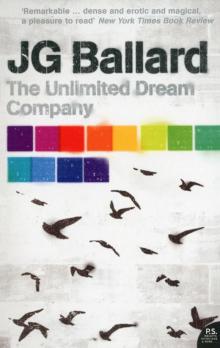 The Unlimited Dream Company
The Unlimited Dream Company Running Wild
Running Wild The Day of Creation
The Day of Creation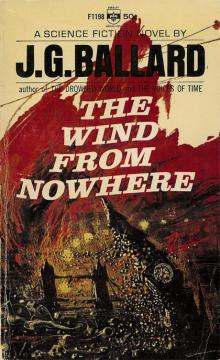 The Wind From Nowhere
The Wind From Nowhere The Complete Short Stories, Volume 2
The Complete Short Stories, Volume 2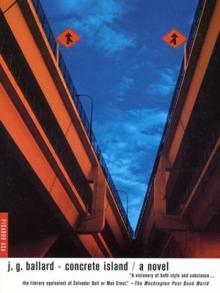 Concrete Island
Concrete Island Empire of the Sun
Empire of the Sun The Kindness of Women
The Kindness of Women Vermilion Sands
Vermilion Sands Super-Cannes
Super-Cannes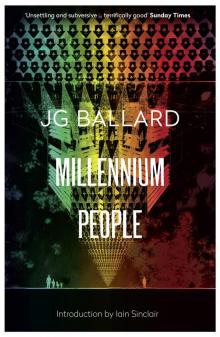 Millennium People
Millennium People The Complete Stories of J. G. Ballard
The Complete Stories of J. G. Ballard Crash
Crash The Drought
The Drought The Atrocity Exhibition
The Atrocity Exhibition The Complete Short Stories: Volume 1
The Complete Short Stories: Volume 1 Miracles of Life: Shanghai to Shepperton: An Autobiography
Miracles of Life: Shanghai to Shepperton: An Autobiography Rushing to Paradise
Rushing to Paradise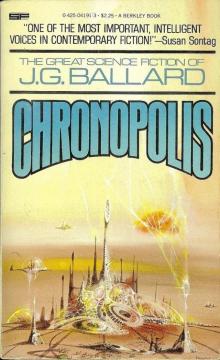 Chronopolis
Chronopolis Cocaine Nights
Cocaine Nights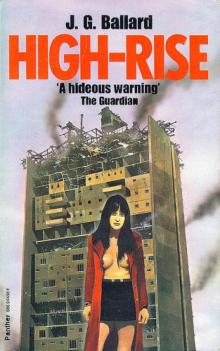 High Rise (1987)
High Rise (1987) The Complete Short Stories
The Complete Short Stories The Day of Creation (Harper Perennial Modern Classics)
The Day of Creation (Harper Perennial Modern Classics) The Crystal World
The Crystal World